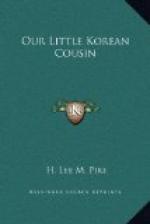To Wang Ken and his pupil were assigned a room near Ki Pak’s library, where Yung Pak would spend several hours each day trying his best to learn the Korean A B C’s.
The first book he had to study was called “The Thousand Character Classic.” This was the first book that all Korean boys had to study, and was said to have been written by a very wise man hundreds of years ago. A strange thing about it was that it was composed during one night, and so great was the wise man’s struggle that his hair and beard turned white during that night. When Yung Pak was told this fact he was not a bit surprised. He thought it was hard enough to have to learn what was in the book, to say nothing of writing it in the beginning.
At the same time that Yung Pak was learning to read, he was also learning to write. But you would have been amused if you could have seen his efforts. The strangest thing about it was that he did not use a pen, but had a coarse brush on a long handle. Into the ink he would dip this brush and then make broad marks on sheets of coarse paper. You would not be able to understand those marks at all. They looked like the daubs of a sign-painter gone crazy.
Later on, Yung Pak had to study the history and geography of his country. Some of the names he had to learn would amuse you very much. The name of the province of Haan-kiung, for instance, meant Perfect Mirror, or Complete View Province. Kiung-sang was the Korean name for Respectful Congratulation Province, and Chung-chong meant Serene Loyalty Province. One part of Korea, where the inhabitants were always peaceable and unwarlike, was called Peace and Quiet Province, or, in the Korean language, Ping-an.
Under Wang Ken’s instruction Yung Pak made rapid progress in his studies, and when the boy’s father questioned him from time to time as to what he had learned, he was very much pleased, and commended his son for his close attention to his studies.
“Sometime,” Ki Pak said to the boy, “if you continue to make such good progress in your studies, you will be able to hold a high position in the service of the king.”
In explanation of this remark, you should understand that no young man was able to enter into the government service of Korea until he could pass a very hard examination in many studies.
Many things besides book-learning did Wang Ken teach his pupil. In all the rules of Korean etiquette he was carefully and persistently drilled.
As you have already been told, Yung Pak had from his earliest days been taught the deepest reverence and honour for his father. This kind of instruction was continued from day to day. He was told that a son must not play in his father’s presence, nor assume free or easy posture before him. He must often wait upon his father at meal-times, and prepare his bed for him. If the father is old or sickly, the son sleeps near him by night, and does not leave his presence by day. If for any reason the father is cast into prison, the son makes his home near by in order that he may provide such comforts for his unfortunate parent as the prison officials will allow.




